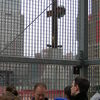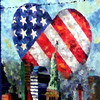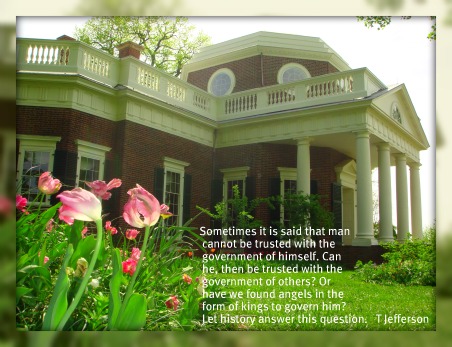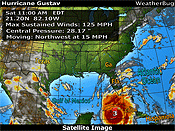First Amendment Facts & Myths (See on bottom but please check out some of the things on this website--put on your favorites--you'll be glad you did--incredible history resources, podcasts etc.)
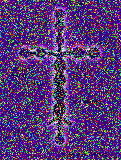 link to podcasts
link to podcasts
This site hopes to remind you of the priceless legacy left by the founding fathers-a blessing for you and me and future generations if we can keep it.
John Winthrop (1588-1649) was the founder and first Governor of the Massachusetts Bay Colony. Though Oliver Cromwell asked him to join the revolution in England, instead he helped form a new world with religious freedom of which we are the proud beneficiary. On June 11, 1630 on board the Arabella, he wrote his most famous work , A Model of Christian Charity, which served as the guide for constitutional covenants of the Colonies. Here is the famous term City upon a hill...
"We shall find that the God of Israel is among us, when ten of us shall be able to resist a thousand of our enemies, when He shall make us a praise and glory, that men of succeeding plantations shall say--The Lord make it like that of New England. For we must Consider that we shall be as a City upon a Hill, the eyes of all people are upon us; so that if we shall deal falsely with our God in this work we have undertaken and so cause him to withdraw his present help from us, we shall be made a story and a by-word through the world."
...there is no acknowledgment of God in the land.
Hosea 4:1

(Eve picking the apple in the Garden of Eden believing the great lie of the enemy which darkened the world)
Another Great Lie
Today many young people are growing up thinking the Word of God and anything of it- has no place in schools, government or even in discussions.--How could this happen that they have been kept from the truth? Truth that founded a great nation free from tyranny. Enter in and know the difference for the price is your future. You decide.
The Supreme Court has given us the "wall of separation between church and state. "
But where did it come from--
The Everson case is where Judge Hugo Black mentioned the words " a wall of separation between church and state."
Who was Judge Hugo Black?
The heart of the Bible belt- Alabama- elected Hugo Black as a senator in 1926 .
Franklin D. Roosevelt called Hugo Black into his office, on August 12, 1937, and within minutes gave a Supreme Court nomination form to Black. Thus Hugo Black was nominated as a United Supreme Court Justice . Hugo Black had Klan connections which was obscure and had not come up in the initial Judiciary Committee deliberations.Although Black's Klan involvement was not an isuue on the nomination, a concerned group of blacks protested the court's choice on the Senate debate. They adopted a resolution protesting Black's appointment which was presented by the Negro physicians of the National Medical Association but because of the war scare facing FDR's administration and the country -- this issue faded into oblivion. Judge Hugo Black's background was questionable then and today his misinterpretation of the founding fathers' intent has opened the door to destruction of America from within. Did he ever study the intent of the Founders?
Read the story of the signer of the Bill of Rights
1st Amendment: Congress shall make no law respecting an establishment of religion, or prohibiting the free exercise thereof; or abridging the freedom of speech, or of the press; or the right of the people peaceably to assemble, and to petition the Government for a redress of grievances.
While the good men slept, the enemy came in. Matthew 13:24
The lie as to the founding fathers intent on the first amendment's meaning started with the 1947 case Everson v. Board of Education.
In it came one of the boldest statements ever to come from the Court, Justice Hugo Black declared, "The 'establishment of religion' clause of the First Amendment means at least this: Neither a state nor the federal government can set up a church. Neither can [they] pass laws which aid one religion, aid all religions, or prefer one religion over another."
Judge Hugo Black stated "In the words of Jefferson, the clause against establishment of religion by law was intended to erect 'a wall of separation between church and state.'"
"That wall must be kept high and impregnable,” Black said. “We could not approve the slightest breach."
That laid the groundwork for the many cases that have since ripped religion out of much of America's public life.
The Truth
The founding fathers sought the teaching of the principles of religion . They wanted God in every aspect of their life not out of it.
New England area was raised with the concept that you would look to the word of God first.
The first education law made was the Massachusett Bay School Law of 1642 which was due to their concern for the need for children to learn the grounds and principles of religion.
In 1647 came the 0ld Deluder satan Act.They believed then it was old deluder satan's chief project to keep us out of acknowledging scriptures which leads to civil and religious atrocities.
They wanted to make sure children could read the scriptures and judge church and state by comparing against the word of God.
Isn't it ironic that today leaders in education are so busy taking the bible and God out of our education yet the founders of this nation knew the key to this nation is God's word?
It's been said prayer was taken out of schools with but a whimper from the Christian community. We have handed the reins of the nation to Justices eager to uproot our Christian Heritage.
The Following Truths about the Separation of Church and State You Must Know:
1. Definition of Religion as used in the First Amendment meant a " single national denomination " --per James Madison August 15, 1789.
2. The term " separation between church and state " is not in the First Amendment but was from a letter by Thomas Jefferson to the Danbury Baptists dated January 1st 1802:
... I contemplate with sovereign reverence that act of the whole American people which declared that their legislature would "make no law respecting an establishment of religion , or prohibiting the free exercise thereof," thus building a wall of separation between Church and State . Adhering to this expression of the supreme will of the nation in behalf of the rights of conscience, I shall see with sincere satisfaction the progress of those sentiments which tend to restore to man all his natural rights, convinced he has no natural right in opposition to his social duties.
Jefferson used the term natural rights which back then was understood to mean "inalienable right "
Here is an explanation from David Barton-go to http://wallbuilders.com/ for more great info on the Constitution.
By definition, “natural rights” included “that which the Books of the Law and the Gospel do contain.” That is, “natural rights” incorporated what God Himself had guaranteed to man in the Scriptures. Thus, when Jefferson assured the Baptists that by following their “natural rights” they would violate no social duty, he was affirming to them that the free exercise of religion was their inalienable God-given right and therefore was protected from federal regulation or interference.
So clearly did Jefferson understand the Source of America’s inalienable rights that he even doubted whether America could survive if we ever lost that knowledge. He queried:
And can the liberties of a nation be thought secure if we have lost the only firm basis, a conviction in the minds of the people that these liberties are the gift of God? That they are not to be violated but with His wrath?
Jefferson believed that God, not government, was the Author and Source of our rights and that the government, therefore, was to be prevented from interference with those rights. Very simply, the “fence” of the Webster letter and the “wall” of the Danbury letter were not to limit religious activities in public; rather they were to limit the power of the government to prohibit or interfere with those expressions.
Significantly, Jefferson attended that Capitol church service just two days after he penned his letter which contained the words separation between church and state showing his opposition, as Madison had done in introducing the Bill of Rights, to a "national" religion. "In attending church services on public property, Jefferson and Madison consciously and deliberately were offering symbolic support to religion as a prop for republican government. " Go to this link in the library of Congress and study it yourself: http://www.loc.gov/exhibits/religion/rel06-2.html
----In short Thomas Jefferson was saying to the Danbury Baptist that their legislature would make no law respecting an establishment of religion meaning a single national denomination like Anglican (like in England), Catholic etc or prohibit the free exercise thereof--meaning they can not interfere with the way they worship.
3.There is no doubt Religion was most important to the Foundation of this nation:
Northwest Ordinance,(Federal law on requirements of how states can obtain statehood ) was passed by Congress and signed by George Washington on August 7, 1789 Article III. It showed that the founding fathers said no territory can become a state in the United States unless the schools in that state were teaching religion and morality as well as knowledge and that is why it is in state constitutions and territorial papers.
Under what is called the organic law of the United States, there are the four foundational documents under which our laws rest.
1.Articles of Confederation
2.Declaration
3.Constitution
4.Northwest OrdinanceThe founding fathers intent on the First Amendment is clear and it is time for each of us to understand it in order to keep our rights and privileges. The founding fathers gave their lives for us to have such a freedom and it is an injustice to them and our children's future to ignore the truth.
History 101 Lesson on the First Amendment
Tyranny moves men into action--a great example is of the story of two Reverends. One was the signer to the Bill of Rights.
First we must start with the story of his brother John Peter Muhlenberg. Rev. John Peter Muhlenberg (there is a statue in honor of him at the Capitol) told his Woodstock, Virginia congregation on Sunday January 21, 1776, "a time to preach and a time to pray. But there is also a time to fight and that time has now come." He faced a crowded church that Sunday morning. In his long black clerical gown, he read the first eight verses of the third chapter of Ecclesiastes, then preached the sermon that has come down through the years as a tradition and a challenge.
After the benediction, he then cast aside his clerical robe to stand before the congregation in the uniform of a Colonel in the Eighth Virginia Regiment. He marched down that aisle as he said "we came here to practice our religious and civil liberties and if we don't get involved we are going to lose those liberties. Who's going with me to defend those liberties?" Drums beat in the churchyard and 300 men and boys followed him and enlisted in the Continental Army with their pastor as their leader which became the 8th Virginia Brigade.
He became a Major General and was one of George Washington's most trusted men. His brother the Reverend Frederick Muhlenberg disagreed with him at the onset and had sent him a letter telling him he would have acted for the best if he'd kept out of this business from the beginning and that John Peter was wrong.
John Peter wrote back in his letter "you accused me of getting involved-that I shouldn't because I am a clergyman. I am a clergyman it is true. I am a member of society as we ll as the poorest of laymen. My liberty is as dear to me as it is to any man shall I then sit still? Heaven forbid it. I am convinced it is my duty so to do and duty I owe to God and my country" [quotes is from David Barton of Wallbuilders on his CD America's Birthday]
In 1777 British invaded NY City and they desecrated and seized his church. Rev. Frederick Augustus Muhlenberg then changed his mind. He too got involved-- so much so that he became the First Speaker of the House. His is one of the two signatures on the Bill of Rights (other is John Adams).
Do you think he would want the First Amendment misinterpreted as the Courts do now? Most certainly not. He and his brother are great examples to the truth behind the first amendment. Courts need to do their job which is to interpret it according to the Founding Fathers intent. Now you know.
These pastors were great leaders of the American Revolution. Another example--the Minutemen of Lexington and Concord. Their leader was the Rev. Jonas Clark. They fought so that we can have the freedoms we enjoy today and one of them is to fight for change in our government peaceably--with discourse and informed votes. Hope many pastors will take up their stand and become involved.
Glorious Things are spoken of Thee, O thou City of God, whose Street be in thee, O New England; The interpretation of it, be unto you, O American Colonies... There are many Arguments to persuade us That our Glorious Lord will have an Holy City in America; a City, the street whereof shall be Pure Gold... There have been Martyrs of Christ in America. The Blood of the Martyrs here, is an Omen that the truths for which they Suffered are to Rise, and Live and carry all before them, in the Land that hath been so marked for the Lord... But our Glorious Lord, will order that the Good Seed ere long, to be cast, upon the Fertile regions of America, and it shall be here find a Good Ground, where it shall bring forth fruit unto astonishments; and unto perpetuity...
by Cotton Mather--1709
For though we walk in the flesh, we do not war after the flesh: For the weapons of our warfare are not carnal but mighty through God to the pulling down of strongholds. casting down imaginations and every high thing that exalteth itself against the knowledge of God and bringing into captivity every thought to the obedience of Christ.
2 Cor 3:5



